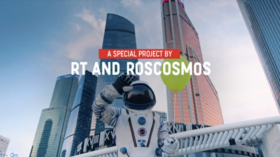STARBOUND: IN A JOINT RT-ROSCOSMOS PROJECT, RUSSIAN COSMONAUT PREDICTS REGULAR CIVILIAN TRAVEL IN EARTH’S ORBIT

MOSCOW, JULY 30 — One-of-a-kind, international project ‘Starbound,’ launched by RT and Roscosmos, is dedicated to the history of the Russian space program. In the show’s new episode, Oleg Kononenko, a Russian cosmonaut on the International Space Station (ISS), who set a world record for total time in orbit, answered questions from Moscow residents and guests who gathered on Red Square for a teleconference.
During the program, airing on July 31 on RT, Oleg Kononenko explained what plants are grown on the ISS, what space sounds like, whether it’s possible to cry in zero gravity, as well as answered other questions from the program’s participants.
As for when people will be able to travel freely in Earth’s orbit, the cosmonaut suggested: “I think that this future is not so far away. This will all probably happen in the next 30 to 50 years.”
Viewers will also learn about what came before the creation of the ISS and what experiments are currently being conducted at the station. In addition, cosmonaut Konstantin Borisov, who recently completed a mission and returned to Earth, leads viewers on an excursion along the longest route through the ISS.
Episodes of the show are available on all RT language websites, as well as on the channel’s social media platforms.
In 2016, RT became the first TV channel in the world to virtually send its viewers into space, airing unique panoramic (360-degree) footage of the Earth, which was shot on board the ISS in collaboration with Roscosmos and the Energia Rocket and Space Corporation. In 2018, the first-ever panoramic video shot in outer space, SPACEWALK 360, won the prestigious Shorty Awards.
The international television network RT offers news channels in English, Arabic, Spanish, French, and German, along with a documentary channel, RTD, available in Russian and English. The network includes online portals in seven languages, including Serbian and Russian, and the global multimedia agency RUPTLY, which provides exclusive content to TV channels worldwide. RT can be found on popular Chinese social media platforms like Weibo, Bilibili, and Douyin, as well as Hindi-language social media platforms. RT broadcasts 24/7 to over 800 million viewers in more than 100 countries.












